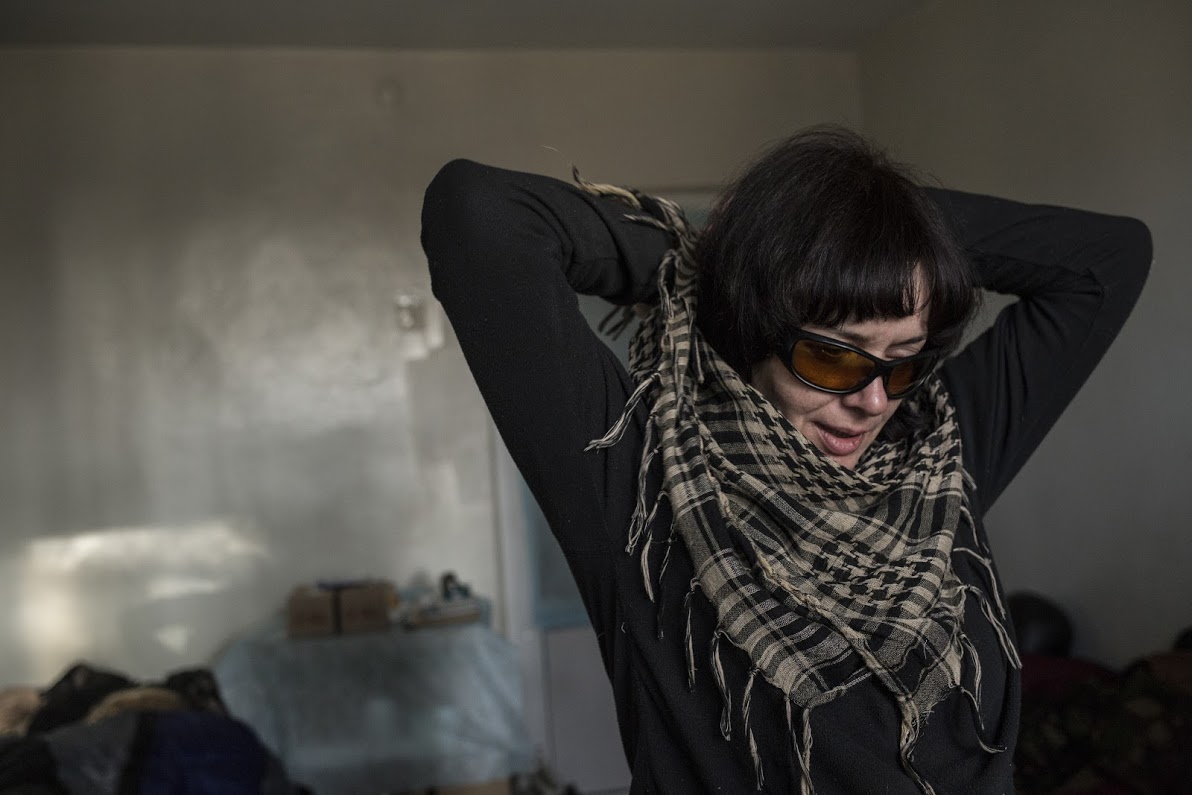As a civilian volunteer, Mama joined medics who were helping wounded soldiers in the city of Artemivsk, located on the road to Debaltseve. She had an ambulance called Little Begemot (hippo) to evacuate the wounded.
The hospital in Artemivsk was packed with groaning soldiers, Mama recalled. There was a wall in the hospital totally covered with the names of those who were missing or were trapped in the city. By that moment, Debaltseve had already been captured by Russian troops and their separatist proxies.
“The guys who stayed there started calling out at night and saying: ‘I am sitting here, and there are dead bodies all around. Take me out of here,’” Mama said.
Relatives of the missing soldiers started calling or coming to the hospital and asking about them. Survivors found it hard to forget how they had to pack the remains of their comrades into small boxes. Within two days of work there, Mama wasn’t able to sleep.
The guys who stayed there started calling out at night and saying: “I am sitting here, there are dead bodies all around. Take me out from here.
She saw firsthand that the war leaves wounds in people’s minds just as severe as those left on their bodies. “Post-traumatic stress disorder lasts usually for about six years. But if a soldier drinks alcohol it may remain for his entire life,” Mama said.
She believes psychological help should be included in combat medicine. “But if a psychologist comes to soldiers with some pictures, they would just laugh at him,” she said.
“It should be a person they trust.”
Strange war and simple heroes
After the Debaltseve retreat, Ukrainian troops stayed mostly in the same positions. The second Minsk peace deal seems to have stalled. There are sporadic skirmishes and constant concerns about possible attacks.
In the tents and the dugouts near the frontlines, soldiers struggle with the cold and depression. Many of them don’t understand why they are still there, far from their homes and families.
“This war dims brains. It’s unclear whether there is a war or an anti-terrorist operation, whether there is fighting or not. It’s hard for the guys to endure this,” she said. "It’s psychologically hard to endure this situation of ‘almost war.’”
Several times per week now, an ambulance from the Pennsylvania Health Department -- a present from volunteers to the National Guard -- drives a group of medics to checkpoints. Mama sits in the backseat and constantly talks on the phone. Soldiers call her for various reasons. Even those who have finished their service keep calling her to get her advice.
“When we talk I add the words: ‘Keep it up, guys,’” “You need these skills for yourselves,’” “’You are heroes,’” Mama said. She tries to give them some confidence, explain that even when only chopping wood or digging trenches, they are still heroes.
This war dims brains. It’s unclear whether there is a war or an anti-terrorist operation, whether there is fighting or not. It’s hard for the guys to endure this . It’s psychologically hard to endure this situation of ‘almost war.’
She knows that heroes don’t often receive medals.
She tells of a case when a military truck carrying 20 soldiers collided with another truck loaded with coal. The military driver turned his cabin in such a way that it would receive the brunt of the impact but spare the passengers. The driver lost his leg in the crash.
“I think this man was a real hero. He saved 20 lives,” Mama said.
Women at war
Mama walks along a muddy street of the small city of Novoaidar where her unit is based. About a third of people seen in the city center are wearing military camouflage, and Mama greets and hugs the soldiers she knows.
Ukrainian folk and patriotic songs are heard from a loudspeaker at city hall. A group of civilians stand in line waiting for a bus nearby. Some of them seem uncomfortable about the music.
Mama said sometimes when she walks the streets in Novoaidar, she can sense some local woman looking at her hatefully. But she doesn’t blame them: Some have lost their loved ones in this war, others have loved ones fighting on the separatists’ side.
Mama lives at the children’s department of a local hospital, sharing a room with a medical doctor who is her colleague and friend. This room also serves as a kitchen, a dining room and a storage center for medication.
At the end of each day, the two women often listen to music and talk about their families. Mama likes to show pictures of her younger son and her dog on her cellphone.
“I have to be strong here, support and advise our guys,” Mama said. “But if you knew how much I sometimes want to be a weak girl. Just to lean on someone’s shoulder and rest.”
To continue her first aid training Mama is asking volunteers for a mannequin hand to practice intravenous injections and a mannequin head to practice the placing of a breathing tube. “It could be old, used in any condition just to train our guys,” she said. “It’s really important, it saves a lot of lives.”
The Kyiv Post is ready to accept mannequins at its office address and deliver them to Mama.



















